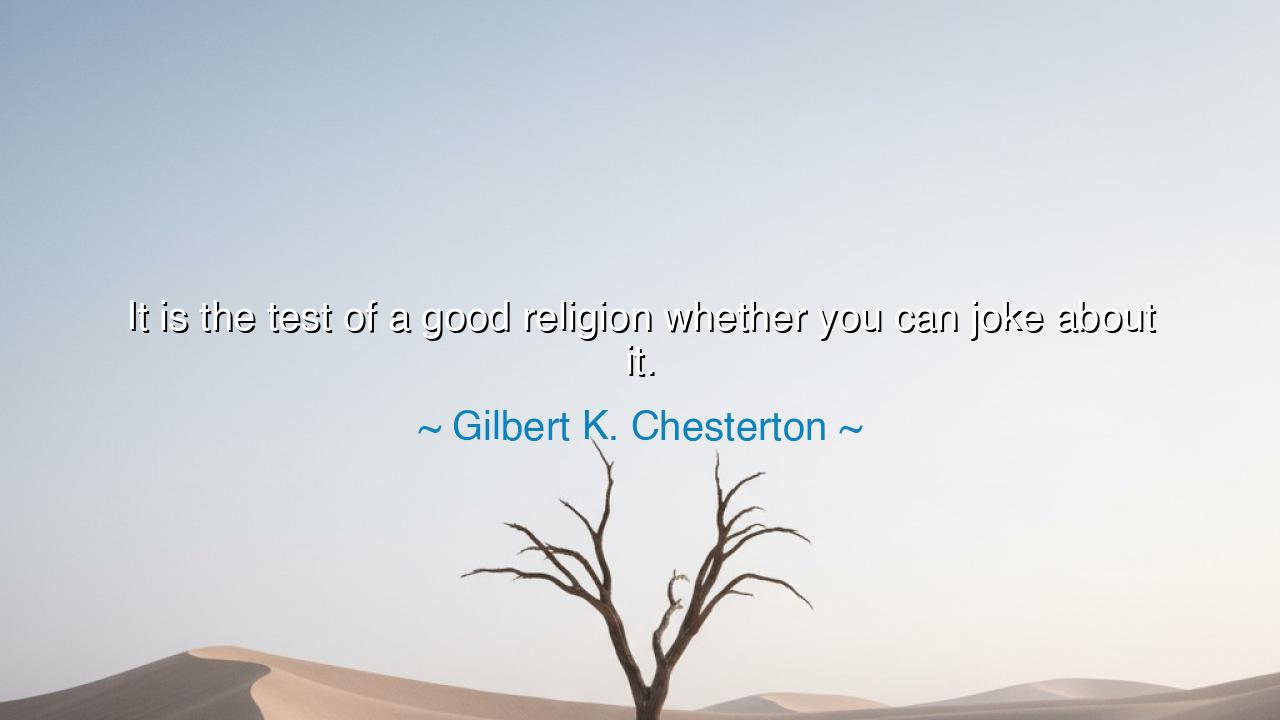
It is the test of a good religion whether you can joke about it.






"It is the test of a good religion whether you can joke about it." These words from Gilbert K. Chesterton cut to the heart of a vital truth about faith and humanity. In his assertion, Chesterton invites us to consider whether a religion—any religion—is truly robust and healthy if it cannot bear the weight of humor. Religion is, by nature, deeply tied to beliefs, values, and practices that guide the moral compass of individuals and societies. Yet, Chesterton suggests that a true and strong religion is one that can withstand the lightness of humor without losing its profound meaning or sacredness. Humor, in this sense, becomes a measure of strength and resilience in faith—able to bear both the weight of reverence and the relief of laughter.
The ancient world was no stranger to this interplay between seriousness and lightness in religion. In Greek mythology, for instance, the gods were both majestic and flawed, exhibiting human-like qualities that allowed for both reverence and mockery. The god Hermes, for example, was both a messenger of the gods and a trickster figure, often involved in playful mischief. His role was one of both high dignity and low humor, showing that even in the divine realm, humor could coexist with the serious matters of life. The ancient Greeks understood that humor, as part of human nature, was not to be suppressed but embraced as a force for balance in a life governed by both divinity and humanity.
In Christianity, humor also found a place within its early traditions. Jesus Christ, while revered as the Son of God, often employed parables, many of which contained elements of irony and wit. His use of humor was not to undermine the sacred, but to illuminate deep truths and to make spiritual teachings more approachable. In his Beatitudes, Jesus spoke of blessedness in ways that turned conventional wisdom upside down, offering teachings that could be interpreted with both seriousness and joy. Even the Apostle Paul used humor in his letters, as he crafted messages that were both profound and playful. In this light, Christianity has a rich tradition of understanding that humor is not a rejection of faith, but an invitation to embrace its deeper truths with grace and humility.
In modern times, this notion of religion and humor as a sign of strength continues to resonate. The great humorists of our time, such as Mark Twain, often explored the contradictions in human nature and religion with wit and satire. Twain’s Huckleberry Finn is a prime example, where religion is portrayed not only with reverence but also with critical humor, questioning the hypocrisy and contradictions of the times. Twain himself once remarked, "It’s not the parts of the Bible that I don’t understand that bother me; it’s the parts I do understand." His humor acted as a mirror, reflecting the human condition and the complexities of faith, suggesting that true faith can bear the weight of questioning and humor without crumbling under the pressure of doubt or ridicule.
Consider the life of Voltaire, whose biting wit and satire often poked fun at the religious authorities of his time. In his Candide, Voltaire skewered the hypocrisy and corruption of the Catholic Church, using humor to reveal deeper moral and philosophical truths. Though his criticism was pointed, his intent was not to destroy religion itself but to challenge its institutional abuses and encourage a more authentic, less dogmatic expression of faith. His writings show that humor, when used wisely, can be a tool for social change and a means of reaffirming the spiritual ideals that religion can inspire.
Chesterton’s lesson is clear: for a religion to be genuinely strong, it must not shy away from humor or the lightness of life. Faith that cannot withstand the mocking or playful examination of its followers is likely to be a faith that is fragile and insecure. Humor, in this light, becomes not a diminishment of religion but a celebration of its strength and resilience. When a religion can be laughed at without losing its integrity, it demonstrates its depth, showing that it is able to engage with the full range of human experience, both the serious and the lighthearted.
In our own lives, we should strive to hold our faith with humility, understanding that belief does not have to be rigid or oppressive. Just as the ancient gods and the wise philosophers understood, faith can coexist with humor, allowing us to approach the divine with both awe and joy. Let us celebrate our beliefs, while also being open to humor, critique, and self-reflection. A true faith, like a true religion, is strong enough to face the weight of humanity—its flaws, its questions, and its laughter—without losing its core of truth and love. By embracing this balance, we honor not only our beliefs but the wisdom of those who have walked the path before us, who understood that humor and faith can coexist, and indeed, that humor can often lead us to deeper understanding.






AAdministratorAdministrator
Welcome, honored guests. Please leave a comment, we will respond soon